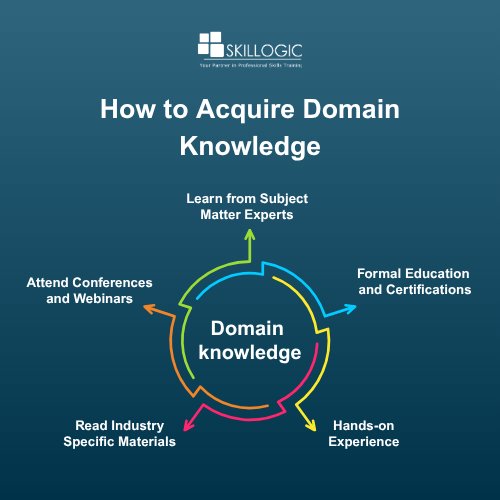Why Domain Knowledge Matters for Every Business Analyst
Discover why domain knowledge is crucial for business analysts to deliver accurate insights, improve communication, and drive successful project outcomes.

In today’s fast-paced and competitive business environment, the role of a Business Analyst (BA) has become increasingly critical. Business Analysts act as the essential link between business stakeholders and technical teams, ensuring that projects deliver value and meet business needs. However, one crucial factor often overlooked by aspiring or even experienced Business Analysts is domain knowledge—a deep understanding of the specific industry or sector in which the business operates.
Domain knowledge isn’t just industry buzz; it’s a strategic asset. It allows business analysts to gather relevant requirements, foster clearer communication, and deliver impactful solutions that align with business goals. This article explores the importance of domain knowledge for business analysts and why developing it can be a decisive factor in long-term success.
Business analysts with Banking, Financial Services and Insurance (BFSI) expertise are in high demand due to the rise in digital banking, fraud detection, and risk analytics.
What is Domain Knowledge?
In business analysis, domain knowledge refers to a thorough understanding of the specific industry, sector, or operational context in which a business operates. It includes familiarity with industry-specific terminology, regulations, processes, standards, challenges, and best practices.
For example, a Business Analyst working in healthcare must understand patient care processes, compliance regulations such as HIPAA, and medical terminology. Similarly, a Business Analyst in finance needs to be well-versed in banking operations, investment products, and financial regulations like SOX or Basel III.
This domain expertise in business analysis enables professionals to interpret business problems through the lens of the industry context, going far beyond general analysis or IT skills.
Read More:
- Cybersecurity Considerations for Business Analysts
- How Business Analysts Drive Digital Transformation
- Bridging the Gap Between IT & Business as a Business Analyst
The Role of a Business Analyst
Business analysts serve as the bridge between stakeholders (like business owners, users, and customers) and the technical teams (developers, testers, architects). Their primary responsibilities include:
Understanding business needs and objectives
A business analyst identifies and clarifies the organization’s goals and challenges. This understanding ensures that all project efforts align with strategic priorities, enabling the delivery of solutions that add real value and support the company’s long-term vision.
Gathering, analyzing, and documenting requirements
The Business Analyst collects detailed information from stakeholders, evaluates its relevance and feasibility, and creates clear, organized documentation. This process ensures all parties have a shared understanding of what the project will deliver, minimizing risks of misinterpretation or scope creep.
Market Research Future projects that India's Data Analytics Market will soar from USD 750 million in 2025 to USD 90 billion by 2035, fueled by a 54.531% CAGR and predictive analytics is poised to significantly drive growth, with projections reaching USD 36 billion on its own.
Communicating between business and technical teams
Business Analysts serve as liaisons, converting business needs into technical requirements for seamless collaboration between stakeholders and IT teams. They ensure technical teams understand business needs while keeping stakeholders informed about technical constraints and progress, fostering collaboration and reducing misunderstandings.
Helping design solutions that address business challenges
Using their understanding of both business goals and technical capabilities, business analysts collaborate with teams to develop practical, effective solutions. They ensure that designs not only solve problems but also align with operational workflows and strategic objectives.
Supporting implementation and testing phases
Business analysts assist in translating requirements into functional solutions during implementation. They help test teams verify that the delivered product meets the defined requirements, facilitating issue resolution and ensuring the final outcome satisfies business expectations.
To effectively carry out these tasks, understanding both the business and its operational environment is essential—underscoring the role of domain knowledge in projects of any scale.
Read More:
- How to become a Business Analyst in India?
- Business Analytics Scope in India
- How to Become a Business Analytics Expert in India?
Why Domain Knowledge Matters for Business Analysts
Exploring why domain knowledge is a critical asset that empowers business analysts to deliver more accurate, relevant, and impactful solutions.
Enhanced Communication with Stakeholders
One of the most significant advantages of domain knowledge is improved communication with stakeholders. Each industry possesses a unique vocabulary filled with acronyms, jargon, and terminology that may seem obscure to those unfamiliar with the field. When a Business Analyst understands these terms, it builds trust and rapport quickly because stakeholders feel understood.
For instance, a Business Analyst working on a healthcare project who knows what an Electronic Health Record (EHR) is can ask the right questions and interpret answers more accurately. This highlights how domain expertise enhances effective communication with stakeholders.
Accurate and Relevant Requirement Gathering
Domain knowledge enables business analysts to identify what requirements are truly important for the project’s success. Without this expertise, a Business Analyst may collect generic or surface-level requirements that do not address the core business problems.
Understanding the domain allows the Business Analyst to probe deeper, ask meaningful questions, and validate requirements against real-world scenarios. This leads to a more comprehensive and relevant requirement set, reducing the risk of scope creep and rework later in the project.
For example, in the retail sector, a Business Analyst familiar with inventory management processes can spot missing requirements related to stock replenishment cycles or supplier lead times, which a non-domain Business Analyst might overlook.
Better Problem-Solving and Decision-Making
Domain knowledge equips business analysts with the context necessary to analyze problems more effectively. When they understand the environment in which the business operates, they can anticipate potential challenges and constraints.
This contextual awareness improves decision-making by allowing Business Analysts to evaluate solutions against business goals, regulatory requirements, and operational realities. It also enables them to propose innovative ideas that align with industry trends and best practices.
A Business Analyst in telecommunications, for example, might explore opportunities created by emerging 5G technologies to improve user experience—ideas that might not occur to someone without relevant domain expertise.
Increased Credibility and Trust
Business analysts showcasing strong domain expertise earn greater trust and confidence from stakeholders. Credibility is critical when negotiating requirements, facilitating workshops, or presenting findings.
A Business Analyst who speaks confidently about industry standards, challenges, and regulations shows that they understand the stakeholder’s world, leading to better cooperation and stakeholder buy-in. This trust is often the foundation of a successful project because it encourages open and honest communication.
The Times of India reports that the Business Process Management sector is experiencing a major shift as companies increasingly adopt AI and automation to enhance operational efficiency. Though experiencing a brief slowdown, the industry is expected to expand by 4.5% to 5% in 2025, surpassing the pace of conventional IT services.
Efficient Risk Management
Every industry comes with its own set of risks—regulatory, operational, market, or technological. A business analyst with domain knowledge can identify these risks early in the project lifecycle.
By recognizing domain-specific risks, such as compliance issues in finance or patient data privacy in healthcare, the Business Analyst can work with teams to mitigate risks proactively rather than reactively. This not only saves time and cost but also enhances the overall quality and success rate of projects.

How to Acquire Domain Knowledge
Gaining domain expertise in business analysis requires continuous dedication and learning. Here are some effective strategies:
Learn from Subject Matter Experts (SMEs)
Stakeholders and SMEs are invaluable resources. Engage them through interviews, workshops, and informal discussions to understand the industry’s nuances, challenges, and workflows. Regular interaction with SMEs can accelerate your learning curve significantly.
Formal Education and Certifications
Consider pursuing certifications or courses specific to your domain. For example, healthcare Business Analysts might benefit from certifications like Certified Professional in Healthcare Information and Management Systems (CPHIMS), while finance Business Analysts could look at Financial Risk Manager (FRM) courses.
The Business Analytics Education and Certification sector worldwide is projected to witness a CAGR of 15–18% in the coming five years.
Hands-on Experience
Nothing beats real-world experience. Try to get involved in projects within your target industry or participate in job rotations. Practical exposure helps you understand the day-to-day realities and improves your ability to anticipate issues and design better solutions.
Read More:
- Business Analytics Course fee in Noida
- Business Analytics Course fee in Patna
- Business Analytics Course Fee in Indore
Read Industry-Specific Materials
Stay updated by reading industry reports, whitepapers, journals, and news. Publications like Gartner, Forrester, or industry-specific magazines provide insights into market trends, regulatory changes, and emerging technologies.
Attend Conferences and Webinars
Participating in industry events helps you network with professionals and stay abreast of the latest developments. Webinars and online seminars also offer convenient ways to deepen your understanding without extensive travel.
These activities not only enhance technical abilities but also strengthen the domain knowledge vs. technical skills in business analysis balance, helping professionals become well-rounded and versatile.
Projects with domain-aligned analysts see 35–50% faster turnaround times and higher adoption of analytics insights, according to McKinsey research.
The importance of domain knowledge cannot be overstated in a Business Analyst’s career. It improves communication, enables accurate requirements gathering, strengthens credibility, and ensures delivery of relevant and compliant solutions. The role of domain knowledge in projects is to add meaningful context—making outcomes more aligned, strategic, and valuable.
Investing time and effort into acquiring and continuously updating your domain knowledge will not only enhance your performance but also open doors to more challenging and rewarding projects.
If you want to stand out in your business analysis career, start mastering your domain today — because understanding the business context is the key to unlocking true business value.
If you're looking to break into this rapidly growing field or elevate your current role, the right training can be a game-changer. Enrolling in a Business Analyst course in Ahmedabad is a strategic step toward seizing opportunities in the evolving digital economy.
SKILLOGIC’s Offline Business Analyst course in Ahmedabad delivers practical, hands-on training led by seasoned industry experts, alongside globally recognized certifications. With over a decade of experience across major Indian cities, SKILLOGIC equips learners with vital skills in Six Sigma, PMP, cybersecurity, and cloud technologies—preparing you to thrive in today’s fast-evolving, tech-driven world. Offering both online and offline coaching, SKILLOGIC is renowned for its training services across key global locations, including major cities in Europe, the UK, UAE, and India.

0
514